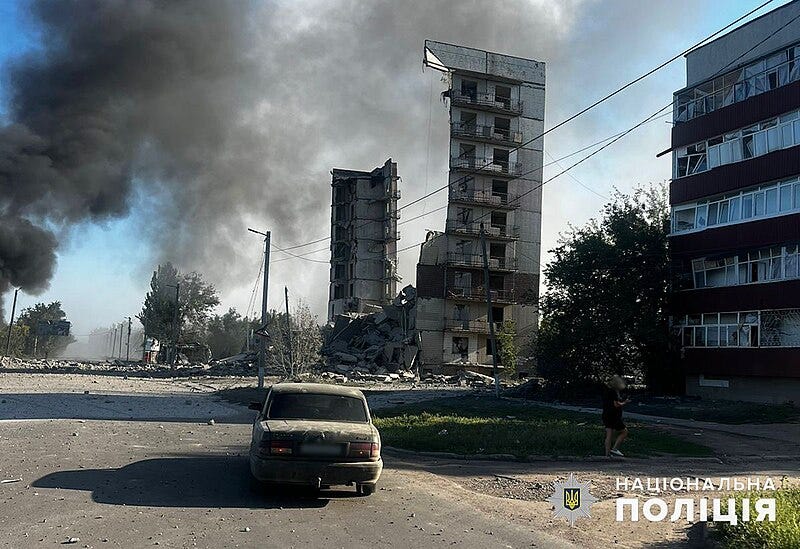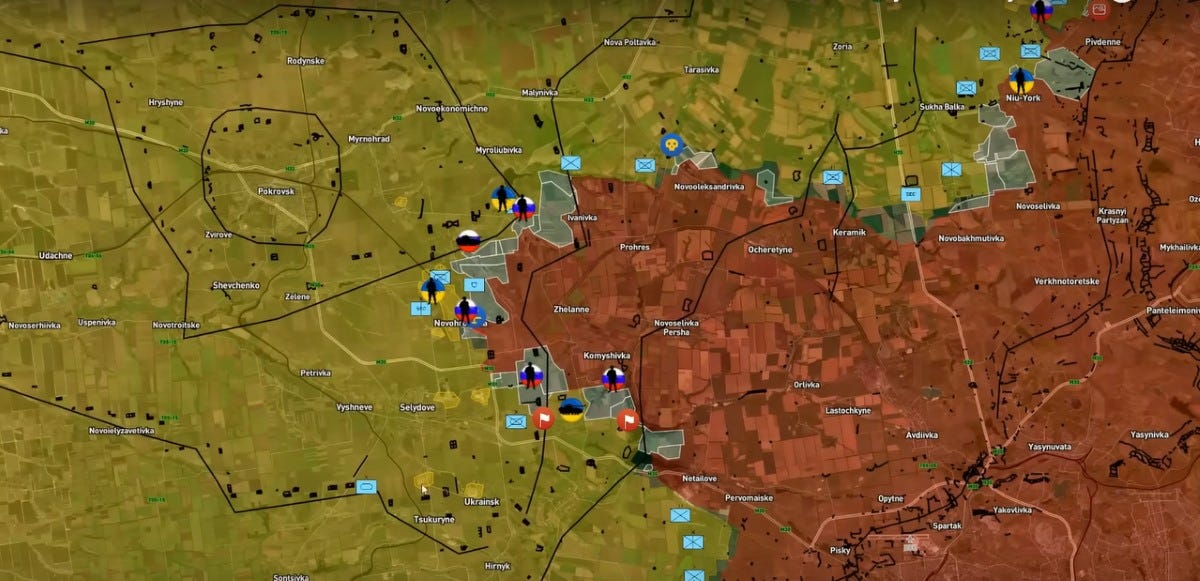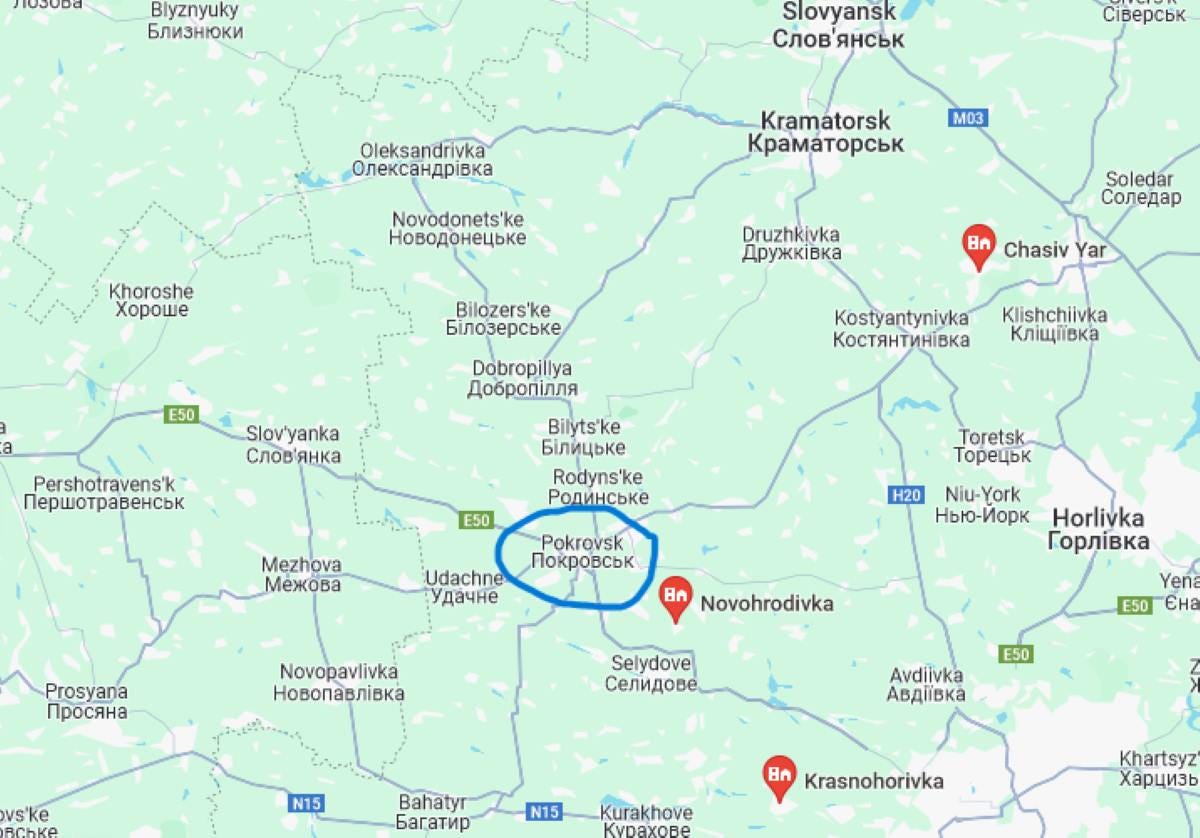The Battle for Pokrovsk
Countering Professor Phillips Payson O’Brien's war propaganda, and MSM hypocrisy, as Ukraine gets in trouble... again.
Ukraine's venture into the Kursk Oblast in Russia has been loud-hailed by Mainstream Media (MSM) as if it isn't a self-inflicting wound. As the propaganda dies, the panic of reality, and the manipulation thereof, sets in.
Pokrovsk is suddenly in the news. The threat of a strategic Ukrainian city falling competes for attention with Ukraine's incursion into Russia. The immediate result is Western media is constantly showing Ukrainian citizens evacuating (somehow more than equal the suffering of fellow Slav citizens in Kursk).
The false narrative of Good versus Evil continues, as does the less reported true story of soldiers needlessly shot or exploded. There's equality in death, but superiority in which side dies the least and captures the most territory.
Pokrovsk, a Ukrainian city in Donetsk Oblast on the Eastern front, will become another episode in that history.
COUNTERING PROFESSOR PHILLIPS PAYSON O'BRIEN
You can read my article, below, but note that it's inspired by the recent war propaganda of Professor Phillips Payson O'Brien.
O’Brien is the American Head of the School of International Relations and Professor of Strategic Studies at the University of St Andrews in the UK.
He also works for CSIS, the #1 'think tank' which previously self-described as "dedicated to finding ways to sustain American prominence and prosperity as a force for good in the world". That would explain why its past 'scholars' include U.S. Secretary of State Tony Blinken (think Ukraine, Israel and China), and ex-Secretary of State Madeleine Albright (think Iraq and Serbia). It’s funded by the U.S. Government, the United Arab Emirates and others. Notably, war profiteers such as Northrop Grumman, Lockheed Martin, Boeing, General Dynamics, and Raytheon Company are no longer displayed on its sponsor page.
I don't recall using a post to contradict anyone on Substack before, but the waste of lives makes me feel more anti-war today. That’s contrary to O'Brien seeming to promote an extension of the killing with his writing in publications such as The Atlantic and The Kyiv Post. I take umbrage at him labelling John Mearsheimer as a "useful idiot" of Putin because if Mearsheimer’s common sense had been listened to, as far back as 2015, half a million people wouldn't be dead.
I’m suspicious of an analyst’s impartiality when he begins his post with “Happy Ukraine Independence Day!”
I'm suspicious of anyone claiming to support Ukraine whilst showing no regard for its death, literal and economic, and its suffering as a proxy war for NATO (but especially the USA and UK).
Zelensky was elected because he promised peace, yet took his country to war. Yet in O'Brien's latest, he’s a cheerleader for Zelensky, and provides analysis that I, without degrees and government funding, believe isn’t analysis.
Consequently, please consider reading his 'Discussion of Kursk Versus Pokrovsk Makes Little Strategic Sense' before continuing here [NB: O’Brien has changed that post from public to subscriber only, probably as a result of my criticism linking. However, when I read his latest free post, he’s bullshitting again].
If you don't have the time, then jump to the next section.
POKROVSK
Professor Phillips Payson O'Brien belittles Russian advances near Pokrovst despite a third of its war offensive being concentrated there.
That link leads to Ukrainian journalists interviewing Vitaliy, a platoon sergeant of the 47th Brigade’s mortar battery:
“We can say that these are the most difficult months for the entire period of our stay in the Avdiivka sector. For our brigade, the last 2-3 months are probably the worst in terms of the number of wounded and losses. Previously, there were two classic assaults – in the morning and in the evening. Now this process is continuous. Our infantry reports every 2-4 hours that they are under attack, and if the logistics are not well organized, sometimes it leads to the fact that the guys simply run out of ammunition and are forced to retreat... If there are unprepared individuals [new conscripts] on the front lines, it is difficult for them to hold their ground. Our infantry is currently composed of mobilized personnel with only a few months of experience, and they are struggling. When neighboring units fail to do their job properly, and our troops become surrounded, the situation can get quite tragic.”
O'Brien misleads with:
The Russians are doing what they have doing for almost 5 months—slowly plod along towards Pokrovsk. We are being told, constantly, that the Ukrainian Kursk offensive has made this Russian operation more successful—but there is little evidence of this at all. If anything, the Russian advance towards Pokrovsk has slowed in the last week. Its getting there, but extremely slowly. Here is the Deep State Map from today. the most forward Russian forces are about 14 kilometres from Pokrovsk. Here is the same map from last Sunday. The closest Russian point to Pokrovsk was just over 15 kilometres. So, the Russian Army has advanced about ONE MILE towards Pokrovsk this week. Yet this ponderous and bloody advance is being portrayed as a great strategic victory—such as in this article in the Times—and at the same time the Kursk Offensive is being relegated to secondary status.
It's convenient of O’Brien to not mention that 15km is less than a band-aid against artillery. One day later, some reports have it at 10km.
More profoundly, why would he leave out that Russia is conquering villages and towns north-east and south-east of that position; ensuring it won't be attacked at its flanks, and that it'll have a broader front to attack Pokrovst with. Such exclusion of territorial loss is diversive.
Komyshivka, Ptyche, Mezhove and others have vanished. Kalynove, Karlivka and others southwards will be next. The Russians head westwards along the M-30 road and the railway for a bigger fight in Selydove. The block will be secured, bringing them directly below Novohrodivka where the Russians have occupied the tallest buildings for a view of Pokrovst.
The fall of Krasnohorivka is a big loss for Ukraine. If the Russians draw a line from Novohrodivka to Krasnohorivka, and conquer everything East, they will need significantly less troops to defend the frontline, rotating the excess to the battle for Pokrovsk.
Although slower, it’s similar north-east of Novohrodivka. Niu York has been crushed, and Toretsk is next.
Undoubtedly, the Kursk operation was conducted well by the Ukrainians, but if that rural region is so important, why has Russia taking time to build a new army for its border whilst increasing its attack on the Pokrovst region? Russia must feel that it's in control. Time will prove that true or not.
O'Brien’s professorship continues with:
The narrative of the war has changed [with the Kursk attack]. Ukraine has pulled off an operation that Russia simply could not. The opsec, speed and fulfilling of goals that the Ukrainians have done in a few weeks constrasts rather remarkably to the Russian offensive in Kharkiv which was launched in May. At the time that Russian attack was hailed as a strategic coup which would lead to huge problems for Ukraine. Now its a beached whale, which has added to Russian losses.
He uses Kharkiv as double false equivalence. He states Russia couldn’t pull off a similar operation, but that is how the war began (despite Kiev and NATO being well aware of the army massing on the border). Secondly, the Russian offensive in Kharkiv oblast was never aimed at taking Kharkiv city, evident by how few troops were used. It’s more probable that it meant to stretch Ukraine thinner, and create another meatgrinder for their soldiers. If so, it was success no matter Russian losses.
O’Brien says that:
Pokrovsk is the latest Ukrainian city to be declared strategic by the press this year (the title has also gone to Avdiivka, Chasiv Yar and Toretsk)…. Hint—none of these areas are strategic as they don’t affect the force generation on either side.
Pokrovst importance is manifold, some of that shared with nearby Chasiv Yar. The targets are the consequence of two of the most well-known and horrific battles of this war which may have turned as much as 20% of the then Ukrainian army into casualties - Avdeevka and Bakhmut were Ukrainian force killers. The former led to the the 'downfall' of General Valerii Zaluzhnyi, and allowed Russia to travel 50km towards Pokrovst which is now a major supply hub close to the frontline. Bakhmut took Russia 17km to Chasiv Yar.
Both stand on elevated positions; Pokrovst at 181m, and Chasiv Yar at 233m. Both major fortifications.
Chasiv Yar is the gateway to the major cities of Kramatorsk and Sloviansk.
Pokrovst may prove more valuable because of the open land behind it. The Ukrainians are building a second defensive line, but it'll be weaker. When it falls, a long section of the frontline falls, and Russia will make major advances.
I wildly speculate (and hope) that would encourage NATO to lean on Zelensky to bring the war to an end i.e., Western corporations now own Ukraine through its debt, and such huge loss of land could outweigh the short-term profit of selling arms.
Momentum is in the Pokrovst direction, but expect Chasiv Yar to reactivate. An additional reason is to ensure that Ukraine cannot redeploy troops from there to tired Pokrovst whose troop rotation has been hampered by the Kursk deployment. Furthermore, with Pokrovst in hand, Russia can advance on Chasiv Yar from a second direction.
He ends with ironic gaslighting:
Rant over—just wanted to point out how very strange the war reporting is. Its more a series of pre-conceived biases being expressed, with evidence cherry picked to support those biases. Its why it was so very wrong at the start of the Kharkiv Offensive, and why it was so ridiculously wrong at the start of the Kursk Offensive. So far the Ukrainian operation is a strategic success.
CONCLUSION
Another damn battle ahead!
The population of Pokrovsk declined this century, to approximately 60,000. Except for soldiers, those will leave within the next week or two. Homes will be devolved into dust, and corpses will multiply. It won't be another Mariupol, Bakhmut or Avdeevka, but it'll be terrible.
Thus it must be remembered that Zelenksy sending his troops into Kursk ensured that peace negotiations would be delayed. Ask Professor Phillips P. O'Brien who benefits. Certainly not regular Ukrainians who will regularly have no power this Winter. Gunfire is cold replacement for light and hope.
According to CSIS, “Professor O’Brien is a first-rate military historian and an acute observer of contemporary conflict.” Plus he teaches students to be responsible adults. I’m just-
Professional Layperson Michael James Hampton.
My previous article, 'The Impossible Battle [Kursk]', is a companion towards understanding the frontline.





What Professor O'Brien and most other fools of his ilk, who have Never served in the military tend to forget to mention, is that the Russians are advancing, contrary to the Ukrainians who are either dug in, or had every opportunity to dig in.
It is generally accepted in military circles that an attacking force such as that of Russia would suffer three times as many casualties, as the defending force, i.e the Ukraine, which is Not the case.
The Russians throughout the conflict have maintained an average casualty ratio of one eighth that of the Ukrainian forces, which means that while they may appear to the Ignorant to be plodding, they are applying a methodology which saves the lives of their troops whilst advancing systematically, without leaving them exposed to pockets of resistance within the areas they have captured, or subject to potential flank attack.
This confirms that the Primary Russian objective is not to gain mass tracts of territory in a short space of time, at the expense of their troops, but to rather atrit the Ukrainian forces, and the territory will come by itself.
General Patton is purported to have said to his troops during WWII, "don't die for your country, make the other bugger die for his", and the Russians have taken this advice to heart, having learnt something from the Soviet experience of WWII.
Thanks for this write up.
The utter callousness of the mass deaths on both sides, and the seeming lack of care about the human consequences to the US/Nato's machinations around the world is horrifying.
Everything in the pursuit of power.